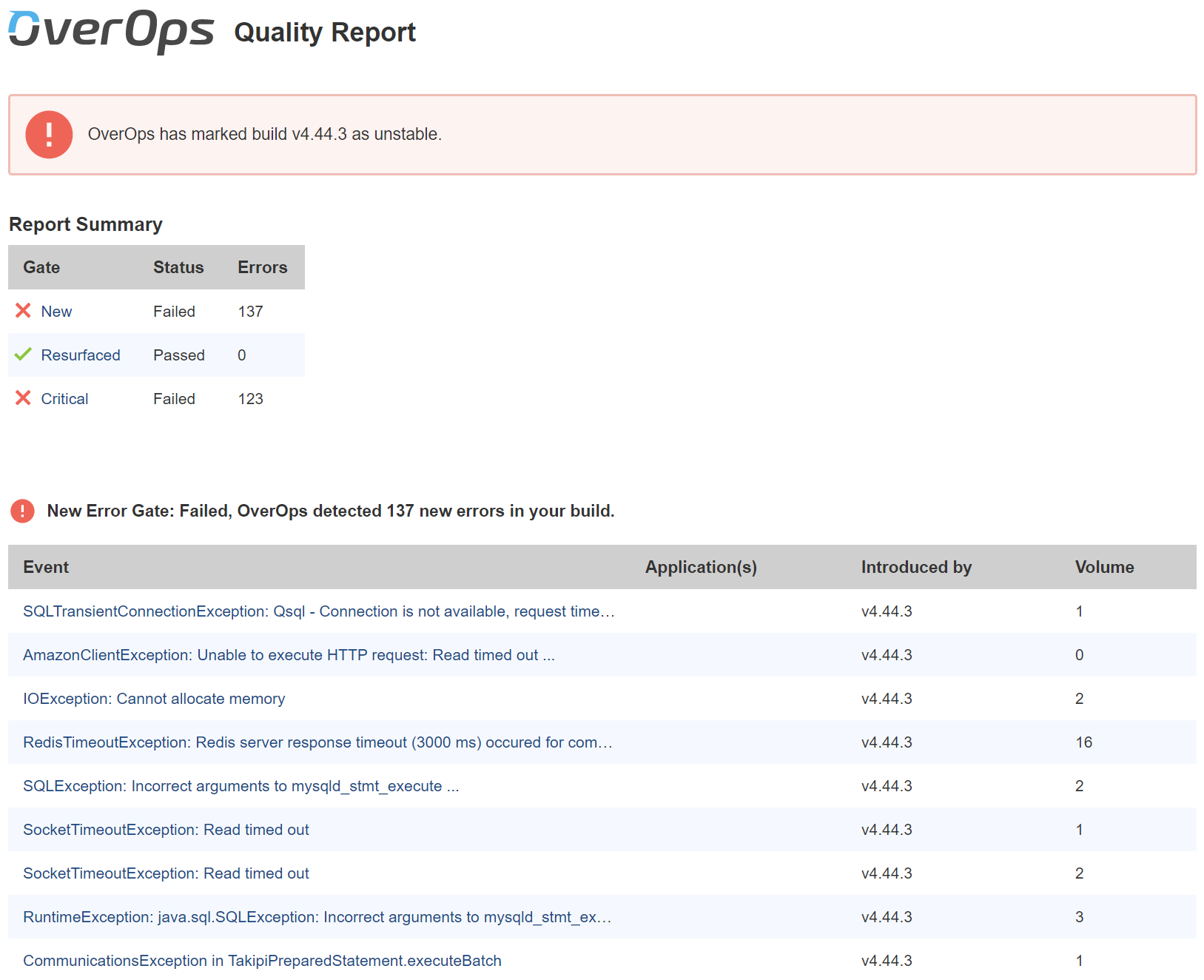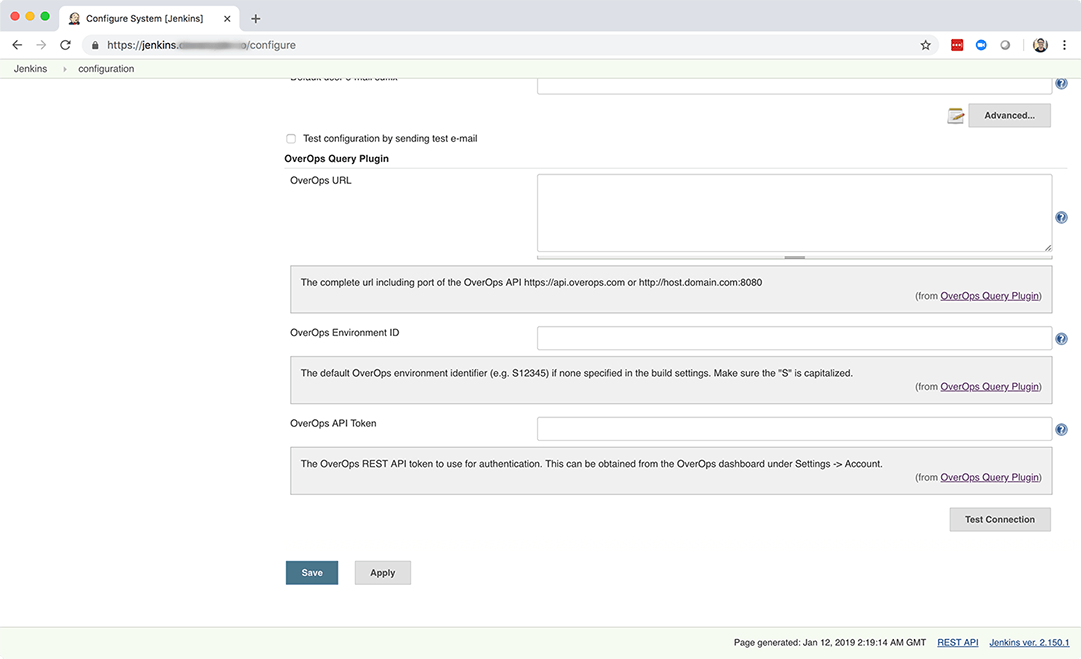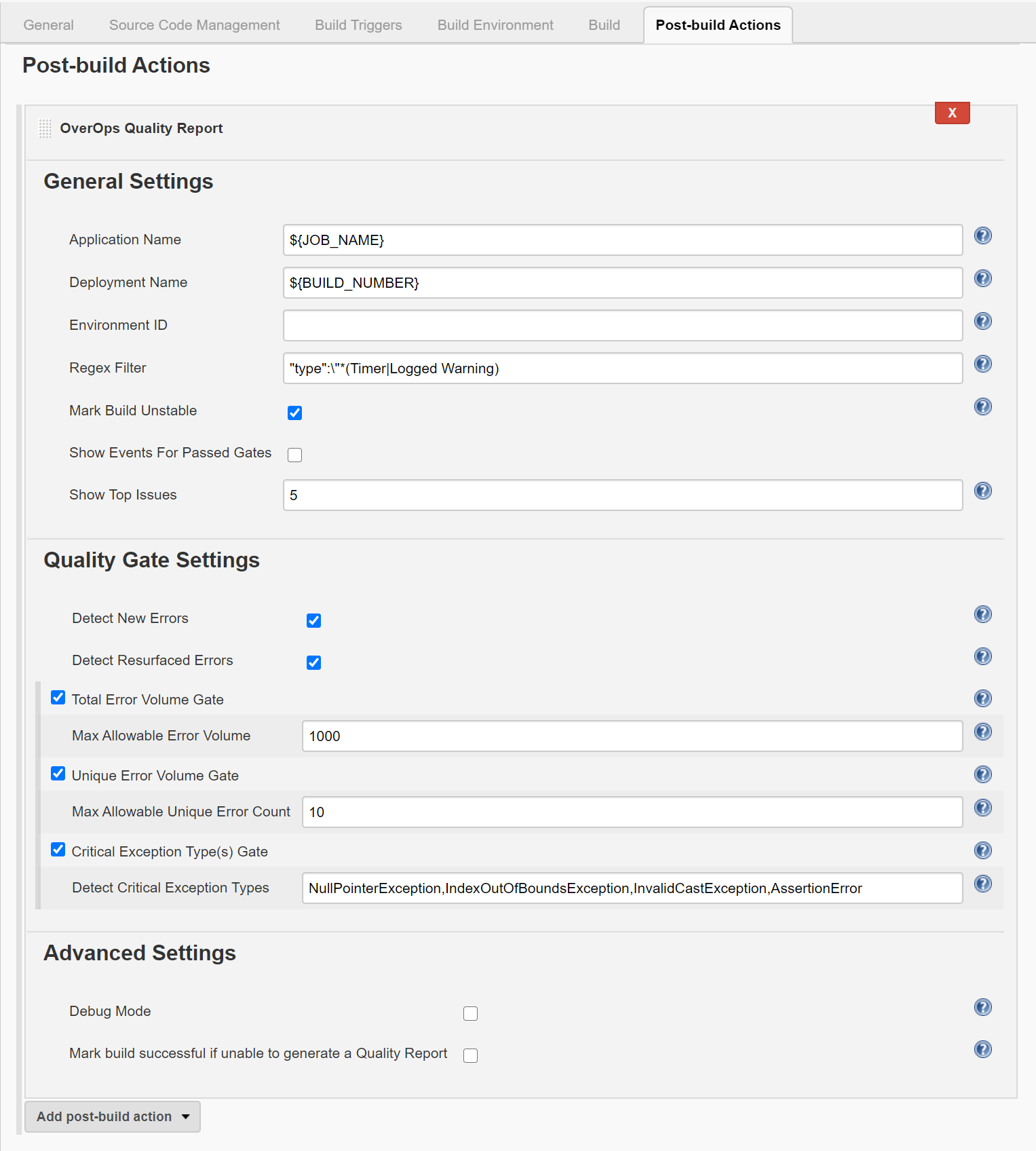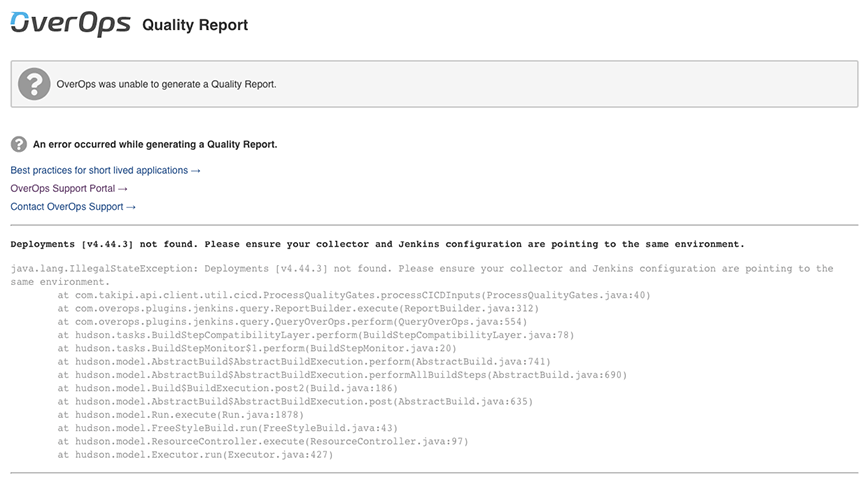This plugin provides a mechanism for applying OverOps severity assignment and regression analysis to new builds to allow application owners, DevOps engineers, and SREs to determine the quality of their code before promoting it into production.
Run this plugin as a post build step after all other testing is complete to generate a Reliability Report that will determine the stability of the build. From the Reliability Report you can drill down into each specific error using the OverOps Automated Root Cause analysis screen to solve the issue.
For more information about this plugin and quality gates, see the OverOps CI/CD Pipeline Integrations guide.
Prerequisites
- Jenkins 2.43 running on Java 1.8 or later
- OverOps installed on the designated environment
Install the OverOps Query Plugin through the Plugin Manager. From the Jenkins Dashboard, select Manage Jenkins → Manage Plugins → Available → scroll down to OverOps Query Plugin.
After installing the plugin, configure it to connect to OverOps.
From the Jenkins Dashboard, select Manage Jenkins → Configure System → scroll down to OverOps Query Plugin.
The complete URL of the OverOps API, including protocol and port. (e.g. https://api.overops.com for SaaS or http://host.domain.com:8080 for on prem).
The default OverOps environment identifier (e.g. S12345) if none is specified in the build settings.
The OverOps REST API token to use for authentication. This can be obtained from the OverOps dashboard under Settings → Account.
Click Test Connection to show a count of available metrics. If the count shows 0 measurements, credentials are correct but database may be wrong. If credentials are incorrect you will receive an authentication error.
Choose a project, then select Configure → Post-build Actions → scroll down to Query OverOps
(Optional) Application Name as specified in OverOps
- If populated, the plugin will filter the data for the specific application in OverOps.
- If blank, no application filter will be applied in query.
Example:
${JOB_NAME }
(Optional) Deployment Name as specified in OverOps or use Jenkins environment variables.
Example:
${BUILD_NUMBER} or ${JOB_NAME }-${BUILD_NUMBER}
- If populated, the plugin will filter the data for the specific deployment name in OverOps
- If blank, no deployment filter will be applied in the query.
The OverOps environment identifier (e.g S4567) to inspect data for this build. If no value is provided here, the value provided in the global Jenkins plugin settings will be used.
A way to filter out specific event types from affecting the outcome of the OverOps Reliability report.
- Sample list of event types, Uncaught Exception, Caught Exception,|Swallowed Exception, Logged Error, Logged Warning, Timer
- This filter enables the removal of one or more of these event types from the final results.
- Example filter expression with pipe separated list-
"type":"s*(Logged Error|Logged Warning|Timer)"
If checked the build will be marked unstable if any of the above gates are met.
If checked all events will be displayed, regardless if the gate has passed or failed.
Prints the top X events (as provided by this parameter) with the highest volume of errors detected in the current build. This is used in conjunction with Max Error Volume and Unique Error Volume to identify the errors which caused a build to fail.
Detect all new errors in the build. If found, the build will be marked as unstable.
Detect all resurfaced errors in the build. If found, the build will be marked as unstable.
Set the max total error volume allowed. If exceeded the build will be marked as unstable.
Set the max unique error volume allowed. If exceeded the build will be marked as unstable.
A comma delimited list of exception types that are deemed as severe regardless of their volume. If any events of any exceptions listed have a count greater than zero, the build will be marked as unstable.
Example:
NullPointerException,IndexOutOfBoundsException
If checked, all queries and results will be displayed in the OverOps reliability report. For debugging purposes only.
If checked, the build will be marked Success if unable to generate a Quality Report. By default, the build will be marked Not Built if unable to generate a Quality Report.
If set to true a link to the Quality Report will be generated and displayed instead of the Quality Report itself. The OverOps Application URL needs to be set for the link to be generated correctly. Also this option, if set to true, voids the Mark build successful if unstable option. This link can be used if it is desired to not fail the build and you do not want to wait for the Quality Report to be generated.
This plugin is compatible with Jenkins Pipeline.
stage('OverOps') {
steps {
OverOpsQuery(
// build configuration
applicationName: '${JOB_NAME}',
deploymentName: '${JOB_NAME}-${BUILD_NUMBER}',
serviceId: 'Sxxxxx',
// filter out event types
regexFilter: '"type":\\"*(Timer|Logged Warning)',
// mark build unstable
markUnstable: true,
// show events if gate passes or fails
showPassedGateEvents: false,
// show top X issues
printTopIssues: 5,
// new error gate
newEvents: true,
// resurfaced error gate
resurfacedErrors: true,
// total error volume gate
maxErrorVolume: 0,
// unique error volume gate
maxUniqueErrors: 0,
// critical exception type gate
criticalExceptionTypes: 'NullPointerException,IndexOutOfBoundsException,InvalidCastException,AssertionError',
// debug mode
debug: false,
// if true, mark build SUCCESS if unable to generate report
// if false, mark build NOT_BUILT if unable to generate report
errorSuccess: false
)
echo "OverOps Reliability Report: ${BUILD_URL}OverOpsReport/"
}
}
All parameters are optional.
| Parameter | Type | Default Value |
|---|---|---|
applicationName |
String | null |
deploymentName |
String | null |
serviceId |
String | null |
regexFilter |
String | null |
markUnstable |
boolean | false |
showPassedGateEvents |
boolean | false |
printTopIssues |
Integer | 5 |
newEvents |
boolean | false |
resurfacedErrors |
boolean | false |
maxErrorVolume |
Integer | 0 |
maxUniqueErrors |
Integer | 0 |
criticalExceptionTypes |
String | null |
debug |
boolean | false |
errorSuccess |
boolean | false |
Starting in v3, all increasing gate settings have been removed and must be removed from your Jenkinsfile. See Breaking Changes below.
Starting in v2, all parameters are optional. You may remove any parameters from your Jenkinsfile which are set to the default value.
- In v3, all increasing gate settings have been removed.
| Parameter | Notes |
|---|---|
activeTimespan |
Removed |
baselineTimespan |
Removed |
minVolumeThreshold |
Removed |
minErrorRateThreshold |
Removed |
regressionDelta |
Removed |
criticalRegressionDelta |
Removed |
applySeasonality |
Removed |
-
In v2,
activeTimespanandbaselineTimespanare now Strings, not Integers. In v1, these values were time in minutes. In v2, appendmfor minutes,hfor hours, anddfor days.For example:
10080(int, in minutes) →'10080m'or'168h'or'7d' -
The
verboseparameter has been renamed todebug. -
The
serverWaitandshowResultsparameters have been removed.
| Parameter | v1 | v2 | Notes |
|---|---|---|---|
activeTimespan |
10080 |
'7d' |
Now a String |
baselineTimespan |
720 |
'12h' |
Now a String |
verbose |
false |
Replaced by debug |
|
debug |
false |
Previously verbose |
|
serverWait |
60 |
Removed | |
showResults |
true |
Removed |
If previous build steps were not successful, the plugin will not run or attempt to generate a Quality Report.
If the plugin runs but is not able to generate a Quality Report, the build will be marked Not Built by default or Success if Mark build successful if unable to generate a Quality Report is checked.
For short-lived applications, we recommend using the -Dtakipi.shutdown.gracetime=20000 agent property.



